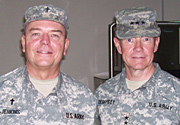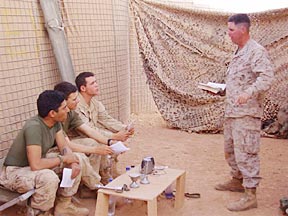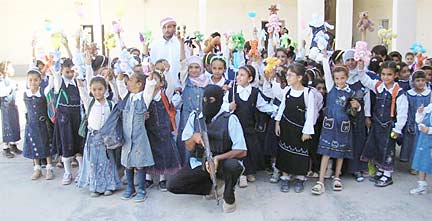Board elects BGCT executive director search committee
Posted: 5/25/07
Board elects BGCT executive
director search committee
By Ken Camp
Managing Editor
DALLAS—The Baptist General Convention of Texas Executive Board elected a 15-member executive director search committee chaired by Ken Hugghins, pastor of Elkins Lake Baptist Church in Huntsville and chairman of the Christian Life Commission.
BGCT President Steve Vernon, First Vice President Joy Fenner, Second Vice President Roberto Rodriguez, Executive Board Chairman Bob Fowler and Vice Chair John Petty recommended a slate of nominees for the committee. Fowler sent an e-mail May 16 to Executive Board directors to notify them of the nominees, and the board elected the committee at its May 21-22 meeting.
The committee, composed of seven Executive Board directors and eight members from the convention at-large, will nominate a successor for Executive Director Charles Wade, who has announced plans to retire Jan. 31, 2008.
The board elected the slate of committee nominees with a smattering of votes in opposition. Several board members voiced concern that the 15-member committee includes only one Hispanic and one African-American.
“That’s the dilemma we faced—how to make sure the committee fairly represents Texas Baptists,” Vernon told the board
The officers strived to create a committee reflective of the BGCT in terms of ethnicity, geography, gender and size of church, as well as providing a balance between laity and clergy, he explained.
They determined to use the membership of Texas Baptist churches as the basis for determining balance, he said. Non-Anglos make up about 20 percent of the members of BGCT-affiliated churches, and the committee is 20 percent non-Anglo, Vernon noted.
In addition to Hugghins, who is an Executive Board member, others on the search committee are:
• Michael Bell, pastor of Greater St. Stephen First Baptist Church in Fort Worth and immediate past president of the BGCT.
• Linda Brian, Executive Board director and layperson from First Baptist Church in Amarillo, a former member of the Christian Education Coordinating Board and the Theological Education Council.
• Jerry Carlisle, Executive Board director and pastor of First Baptist Church in Plano, and chair of the education subcommittee of the Executive Board’s Institutional Relations Committee.
• Stacy Conner, pastor of First Baptist Church in Muleshoe and former second vice president of the BGCT.
• Teo Cisneros, pastor of Templo Jerusalem Baptist Church in Victoria, a Baptist University of the Americas trustee and recent chair of BUA presidential search committee.
• Gloria DuBose, Executive Board director and lay person from First Baptist Church in Midland, and a member of the WorldconneX board.
• Gary Elliston, layperson from Park Cities Baptist Church in Dallas, a Baylor University regent and former chair of Howard Payne University’s board of trustees.
• Elizabeth Hanna, Executive Board director and layperson from Calder Baptist Church in Beaumont, chair of the finance subcommittee of the Executive Board Administration Support Committee.
• Mary Humphries, layperson from First Baptist Church in Tyler and a past president of Woman’s Missionary Union of Texas.
• Dan Malone, layperson from First Baptist Church in El Paso, member of the Baptist Standard board of directors, and former member of the BGCT Administrative Committee.
• John Nguyen, Executive Board director and pastor of Vietnamese Baptist Church in Garland, and president of the Vietnamese Baptist Fellowship of Texas.
• Jim Nelson, Executive Board director and layperson from Hyde Park Baptist Church in Austin, and former Executive Board vice chair.
• Steve Wells, pastor of South Main Baptist Church in Houston and member of the Truett Theological Seminary Advisory Board.
• Dan Wooldridge, pastor of Crestview Baptist Church in Georgetown and immediate past second vice president of the BGCT.
The board also elected two institutional representatives and two staff representatives who will serve as nonvoting advisers to the search committee. Gary Cook, president of Dallas Baptist University, and Jerry Bradley, president of Children at Heart Ministries, will serve as institutional representatives. Jane Wilson, youth ministry and youth Bible study specialist, and Keith Crouch, church architecture director and resource services team leader, will serve as BGCT Executive Board staff representatives.
In other business, the Executive Board:
• Received a report from the Hispanic Education Task Force and referred the group’s recommendations to the board’s Missions & Ministries Committee.
• Approved $350,000 from a fund established by the Sam Combs estate to be used toward debt retirement of Breckenridge Village in Tyler, a residential facility for mentally challenged adults operated by Baptist Child & Family Services.
• Authorized a change in the Dallas Baptist University articles of incorporation that will allow the school to increase its board of trustees from 36 to 40 members.
• Accepted and approved the 2006 financial audit report from the Grant Thornton accounting firm. The audit provided an “unqualified”—that is, clean—opinion from the accountants that the financial records materially and fairly present the BGCT’s financial position.
• Went on record affirming Wade’s response to concerns expressed by Basin Baptist Network and Golden Triangle Association. The associations asked the executive director and the board to clarify the BGCT position regarding the nature of God in light of comments by a speaker at Christian Life Commission conference who said Christians and Muslims talk about “the same God.” The board reaffirmed Texas Baptists’ belief in Jesus Christ as “the unique Son of God and the only way of salvation.”













